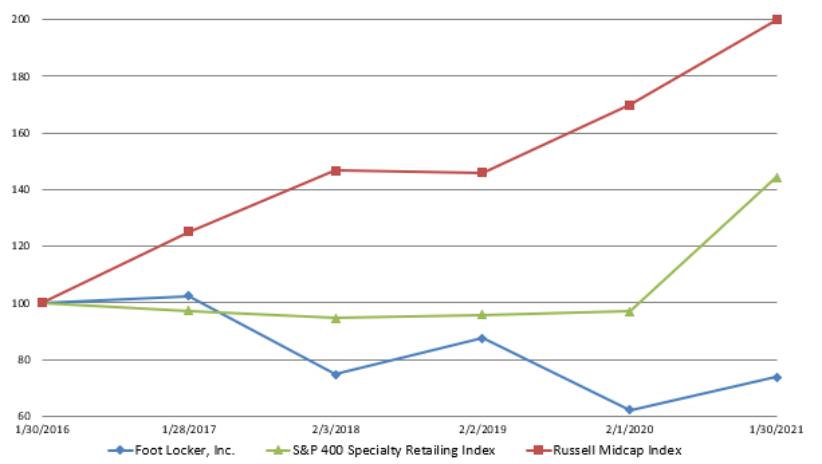We may experience fluctuations in, and cyclicality of, our comparable-store sales results.
Our comparable-store sales have fluctuated significantly in the past, on both an annual and a quarterly basis, and we expect them to continue to fluctuate in the future. A variety of factors affect our comparable-store sales results, including, among others, fashion trends, product innovation, promotional events, the highly competitive retail sales environment, economic conditions, timing of income tax refunds, changes in our merchandise mix, calendar shifts of holiday periods, declines in foot traffic, supply chain disruptions, and weather conditions.
Many of our products represent discretionary purchases. Accordingly, customer demand for these products could decline in an economic downturn or if our customers develop other priorities for their discretionary spending. These risks could have a material adverse effect on our business, financial condition, and results of operations.
The effects of natural disasters, terrorism, acts of war, acts of violence, and public health issues may adversely affect our business.
Natural disasters, including earthquakes, hurricanes, floods, and tornadoes may affect store and distribution center operations. In addition, acts of terrorism, acts of war, and military action both in the United States and abroad can have a significant effect on economic conditions and may negatively affect our ability to purchase merchandise from suppliers for sale to our customers. Any act of violence, including active shooter situations and terrorist activities, that are targeted at or threatened against shopping malls, our stores, offices or distribution centers, could result in restricted access to our stores and/or store closures in the short-term and, in the long-term, may cause our customers and employees to avoid visiting our stores.
Public health issues, such as COVID-19, flu or other pandemics, whether occurring in the United States or abroad, could disrupt our operations and result in a significant part of our workforce being unable to operate or maintain our infrastructure or perform other tasks necessary to conduct our business. Additionally, public health issues may disrupt, or have an adverse effect on, our suppliers’ operations, our operations, our customers, or result in significantly lower traffic to or closure of our stores, or customer demand.
Our ability to mitigate the adverse effect of these events depends, in part, upon the effectiveness of our disaster preparedness and response planning as well as business continuity planning. However, we cannot be certain that our plans will be adequate or implemented properly in the event of an actual disaster.
Any significant declines in public safety or uncertainties regarding future economic prospects that affect customer spending habits could have a material adverse effect on customer purchases of our products. We may be required to suspend operations in some or all of our locations and incur significant costs to remediate concerns which could have a material adverse effect on our business, financial condition, and results of operations.
Riots, vandalism, and other crimes and acts of violence may affect the markets in which we operate, our customers, delivery of our products and customer service, and could have a material adverse effect on our business, results of operations, or financial condition.
Our business may be adversely affected by instability, disruption, or destruction, regardless of cause, including riots, civil insurrection or social unrest, and manmade disasters or crimes. Such events may result in property damage and loss and may also cause customers to suspend their decisions to shop in our stores, interrupt our supply chain, and cause restrictions, postponements, and cancellations of events that attract large crowds and public gatherings, such as store marketing events.
Additional risks and uncertainties not currently known to us or that we currently deem to be immaterial also may adversely affect our business, financial condition or operating results.
Risks Related to Technology, Data Security, and Privacy
We are subject to technology risks including failures, security breaches, and cybersecurity risks that could harm our business, damage our reputation, and increase our costs in an effort to protect against these risks.
Information technology is a critical part of our business operations. We depend on information systems to process transactions, make operational decisions, manage inventory, operate our websites, purchase, sell and ship goods on a timely basis, and maintain cost-efficient operations. There is a risk that we could experience a business interruption, theft of information, or reputational damage as a result of a cyber-attack, such as an infiltration of a data center or data leakage of confidential information, either internally or at our third-party providers.





